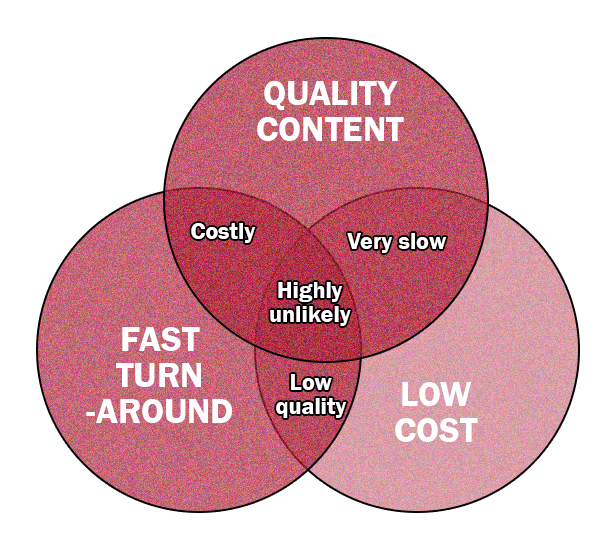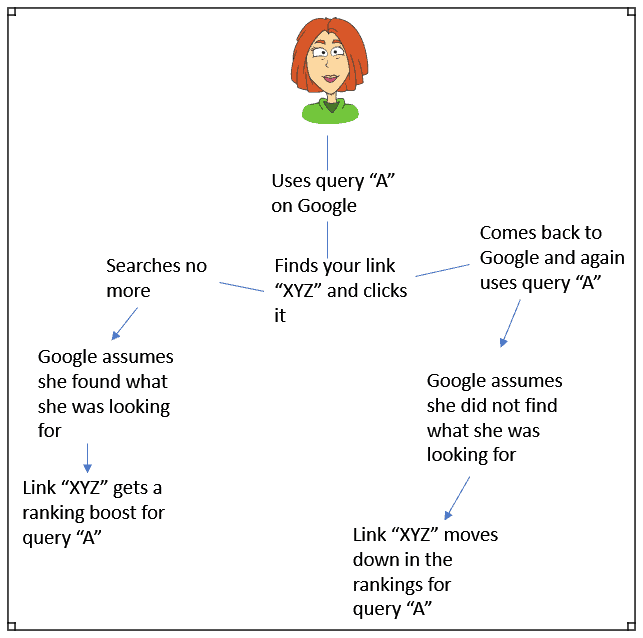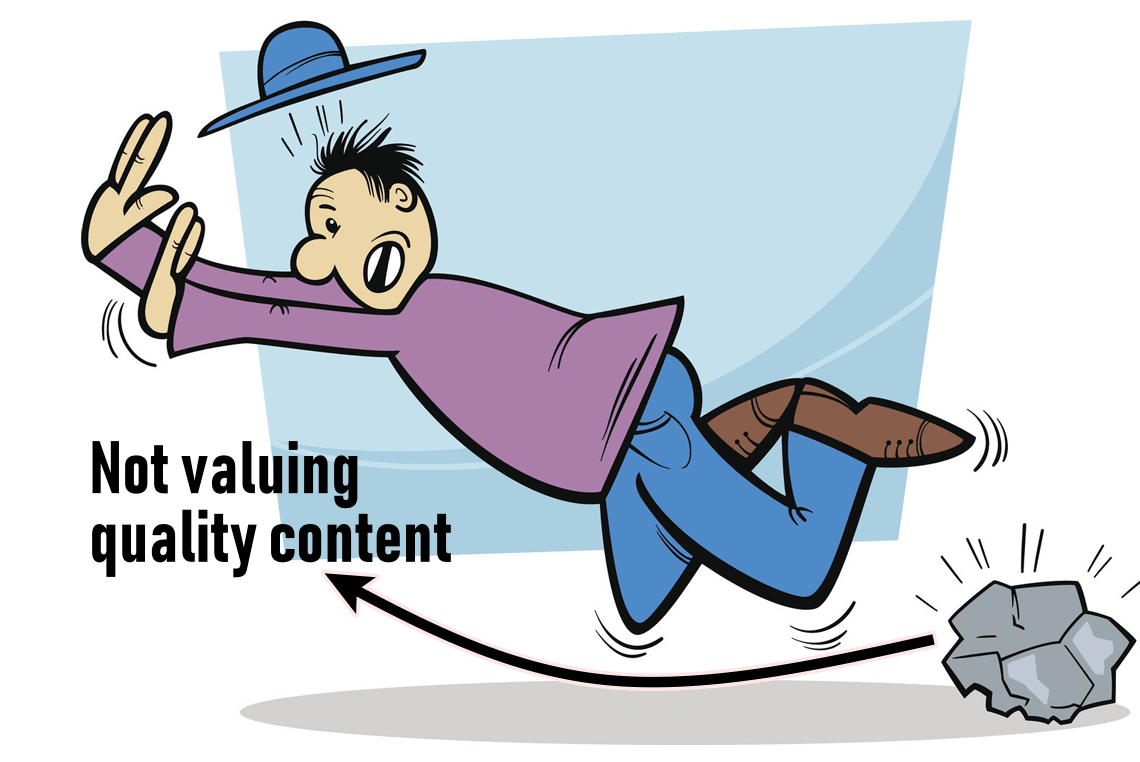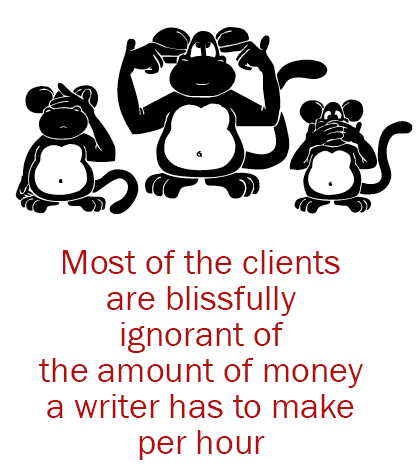
As a content writer almost all the time I’m writing content to improve people’s search engine rankings.
Yes, people want good content.
They want content that is well-written, content that is crisp and content that is error-free in terms of spelling, grammar and originality.
Then what’s the problem?
Very few people “truly” understand the importance of quality content.
Why do I say so?
Because they are not ready to pay for it.
How do you gauge that something is important for you?
By the amount of money you are ready to spend.
I’m not saying that you pay through your nose just for the heck of it.
If you’re doing that, then obviously, you don’t understand what you really need.
Yesterday, while working on another web page titled “blog writing services”, I quickly created this graphic to illustrate a point:

The graphic illustrates that it is very difficult to strike a balance between good content, fast turnaround time and low-cost.
You can see in the graphic within various shaded areas that if you need quality content fast, it is going to be very costly.
If you don’t want to spend much but still you want quality content (writing your own content, as and when you can), the process might be very slow.
There is nothing wrong in that – the slow content writing process.
Fast turnaround time and low-cost leads to low quality and low-quality content helps no one.
An average client wants quality content fast, at a low cost, which, since content is not, at least not yet, produced by machines, is impossible.
This is where everybody gets trapped in a warp: they understand the importance of good content, but they don’t want to pay for it, which basically means, they don’t understand the importance of good content, because, if something is important to you, if you know that it can have a big impact on your business, then you obviously don’t mind spending money on it.
I know, big sentence, but I’m sure you can understand it.
Here is a nice blog post published in Search Engine Journal, titled, “Don’t invest in content unless you can be #1 – Here’s why”.
The moot point of the blog post is, there is no escaping from giving your best when it comes to using content to market your business online.
Otherwise, it is the same old “rich getting richer and poor getting poorer” situation.
People who enjoy higher search engine rankings due to the quality of their content keep getting ranked higher and people who don’t enjoy higher search engine rankings due to the poor quality of their content keep getting ranked lower.
Why shrugging away from good content is both waste of time and money?
Why do you want to post content on your website or blog?
The most obvious reason is that you want to improve your search engine rankings.
Yes, people actually believe that if they can get more clicks from search engines, their business will naturally grow.
They want to get more traffic.
Yes, you can manipulate your content to generate traffic from search engines.
The problem is, although you can manipulate your content the first time, after Google (it can be any search engine) starts tracking the sort of traffic your content is generating, it begins to evaluate many factors, and one of the most important factors is, searcher’s intent.

Searcher’s intent is, exactly why someone is looking for that bit of information?
This is one thing.
The other thing is, does the searcher find what he or she is looking for on your link for which you are ranking well, or have just begun to rank well?
Google uses a very simple way of finding if you’re truly representing a keyword: if a person uses a query on Google, comes across your link, clicks the link and when he or she does not repeat the query, Google assumes that he or she found the information he or she was looking for and there is no need for him or her to carry on with the same query.
I have explained this in the graphic below:

Quite logical.
The more people your link satisfies, the higher it moves in rankings.
The opposite also works.
If a person uses a query on Google, comes across your link, clicks the link and when he or she repeats the query, Google assumes that he or she did not find the information he or she was looking for, for that particular search term.
The more people repeat the query after visiting your link, the lower it moves in rankings.
After searcher’s intent, another thing Google looks for is the time people spend on your blog or website after having found your link in the search results.
Yes, whether you like it or not, Google has a way of finding how much time people spend on your website.
So, if they leave your website very fast, maybe a few seconds, Google assumes that your website does not have relevant information.
On the other hand, if people spend more time on your website after coming across your link in the search results, Google sees it as a positive sign and consequently, improves your search engine rankings.
What do we conclude here?
We conclude that yes, initially, you need to make an effort to appear in the search results so that people come across your link.
But after that, your rankings mainly depend on the experience people have on your website.
The above Search Engine Journal link says that 90% of the clicks in the search results are lapped up by the top 5 search results.
The first five positions still get pretty much all of the action – as much as 90 percent according to some studies. That leaves a paltry 5% percent or less for everyone else outside the top five.
But once they begin to come across your link and start clicking it, your rankings depend on their subsequent behaviour:
- Do they carry out the same query?
- Do they spend very little time on your website?
- Are they satisfied with the information and hence, don’t carry out the same query?
- Do they spend more time on your website?
This behavior you can control only with quality, relevant content.
This, is where people begin to falter.

They want to pay the bare minimum.
They get the bare minimum.
I mostly provide content writing services and I think the problem is with the attitude, especially related to writing.
Most people have this impression that writing is, well, just writing.
The purpose of this blog post is not to explain whether writing to generate business is hard or easy (because on that we can debate till the proverbial cows come home), the purpose is, explaining why settling with mediocre content gets you trapped in the loop of non-performance and the more mediocre content you publish, the deeper you sink.
Now, how do you differentiate between good content and mediocre content?
The above Search Engine Journal link gives an example of a study that they did: they gave the same topic to multiple content writing agencies and then they compared the quality against factors such as originality, plagiarism, linking to internal and external links, the overall quality of writing and the use of images.
The average rate paid to every content writing agency was $100.
After getting the article written they approached around a dozen industry experts and asked them if they would like to publish one of the copies of those articles.
Just one industry expert agreed to publish one of the articles and that too, after some changes.
Why did this happen?
I personally believe that most of the content writing agencies Search Engine Journal contacted provide decent content (have never worked with them, being myself a content writer).
Content writers and content rating agencies are forced to charge less and consequently, forced to compromise on quality because most of the clients are not looking for quality content.
They are looking for “good enough” content for which they can pay a minimum amount.
So, when you’re constantly looking for “good enough” content and wanting to pay the minimum possible amount, it is a race towards the bottom because then, everybody begins to compete on how less one can charge.
A good blog post of 2000-3000 words, with research, takes around 4 to 5 hours.
Sure, if you are just focusing on the number of words, one can write 2000-3000 words even in two hours or even in one and ½ hours.
But a good blog post is not about the number of words (yes, these days number of words matter), it is about the information that you are providing, and the way you are providing that information.

Most of the clients blissfully ignore the amount of money a writer needs to make per hour.
Although there are many content factories/content agencies on the web, when a writer is working on your assignment, he or she is working on just your assignment.
A writer cannot be working on 3-4 articles or blog posts simultaneously.
So, if he or she is being paid, let’s say, $50 for a 3000-word blog post, how many hours do you think he or she is going to spend writing those 3000 words?
His or her best interest lies in spending least amount of time to make more money.
He or she will be less interested in the quality of your blog post and more interested in finishing it as soon as possible.
Even if he or she doesn’t want to compromise with quality, economically it won’t be feasible for him or her to spend more time on your content writing.
This is an all-pervasive dilemma.
This problem is going to persist as long as clients are more interested in how much they want to pay rather than how the quality is going to be.
They need to remember that content is not something that is mass produced and hence, it doesn’t mean that the more one writes, the less one can charge.
So, what is the solution if you have limited budget?
It is understandable that one may have a limited budget.
It is strange that the attitude that people have for tangible goods and services doesn’t reflect the same attributes when it comes to paying for services.
For example, people know that a better car is going to be expensive than a not-so-better car.
This is applicable practically to every product. A better TV is expensive. A better cell phone is expensive. A better room in a hotel is expensive.
And people don’t mind paying more for better things.
But they mind paying for better content or at least, they think that they should be able to get better content even after paying less.
In general life, if you can’t afford a good thing, you reconcile to the fact and make do with the less expensive thing, but somehow, when it comes to content writing, this reconciliation is missing.
Mostly this is because they think that when someone is writing content one is simply using a skill and nothing much.
There is no official course in writing.
To be a lawyer you need to study law. To be an engineer, you need to study engineering. To be a doctor, you need to study medicine. To be a professor, well, you need to be a professor.
So, people don’t mind paying a premium for services related to these fields.
But writing? Oh yes, even the nephew can write it, it’s just that, he is not available yet.
Anyway, this is not about attitude I’m talking about, but the monetary constraint.
Assuming that you know that good content is costly, so, how do you create a wealth of content on your website?
Go for less content.
With Google and other search engines shifting their primary focus on quality and relevance rather than quantity, it doesn’t make sense to publish lots of low-quality or mediocre content.
The above-linked Search Engine Journal blog post rightly quotes someone saying:
“What is not obvious until you’ve been doing it for a little while is that effort is linear, but results are exponential. So working twice as hard on something sounds crazy. But, actually, if you get four times the results by working twice as hard, it is efficient. You know, working ten times as hard on something? Why would I do that? Because marketers that put in 10x effort get like 100x the results.”
The outcome that you get with the time and money that you spend getting one high-quality blog post written outweighs the outcome that you get with the same amount of time and money you spend getting 10 mediocre blog posts written.
So, when you’re getting your content written, your primary focus should be on the quality, on the relevance and on whether it satisfies the searcher’s intent or not, rather than how many keywords you can cover.
Does it cost more? Sure.
A better writer is always going to cost you more than a non-better (yes, yes, no such word) writer.
You have a choice.
